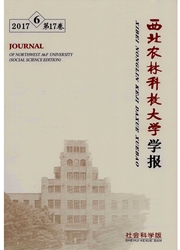

 中文摘要:
中文摘要:
运用Biprobit模型和Switching模型,对陕西省宝鸡市渭滨区247户农户调查的微观数据,分两个阶段对农户受到信贷配给的影响因素及程度和信贷配给下农户的福利效应进行计量分析,结果表明:金融资产余额对资金的供给和需求均为负向影响;是否加入农业合作社对资金的供给和需求均为负向影响;总支出对需求的影响显示为正向;家庭劳动力比率、纯收入和固定资产余额对资金供给为正向影响;农户受到信贷约束的程度为74.63%,受到信贷配给的农户的信贷资金有效利用率是未受到信贷配给农户的2倍。
 英文摘要:
英文摘要:
Based on 247 rual households' data and using Biprobit model and Switching model,this study is divided into two phases to analyze the influencing factors,the degree of credit rationing and its effects on farmers' welfare.The results show that:the financial assets has negative impact on both supply and demand of funds;whether to join the Rural Cooperatives has negative impact,too;the total expenditure has positive impact on demand of funds;net income and the fixed assets has positive impact on supply;the degree of credit rationing is74.63%;the farmers,influenced by credit rationing,could use the loan more efficiently by two times than the farmers who are not influenced.
 同期刊论文项目
同期刊论文项目
 同项目期刊论文
同项目期刊论文
 期刊信息
期刊信息
